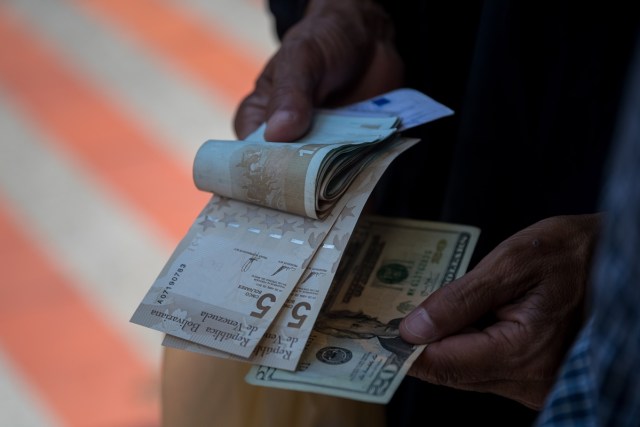
Last Tuesday October 17th, two agreements were signed in Barbados between the Nicolás Maduro’s regime and the Unitary Platform, one of them related to electoral guarantees for the coming 2024 elections.
lapatilla.com
In response, the US Treasury Department issued four general licenses that lift some sanctions for six months on Venezuela’s oil, gas and gold sectors. However, the US government has warned that it will revoke these authorizations if Maduro’s regime does not comply with the agreements.
Furthermore and given the questions that have arisen among the Venezuelan population, LaPatilla’s team spoke with the economist and oil expert, José Toro Hardy.
– Does the agreement reached in Barbados further legitimize Maduro?
No, what the agreement reached in Barbados does is refresh the political game in Venezuela a little, it does not legitimize Maduro.
He desperately needs resources and that is why he accepts that this agreement be signed, but by accepting he assumes a series of commitments, which have already been indicated by the US and the international community: accepting that there are transparent elections and that a date be set, he has to accept that political prisoners are released, you have to accept that there are no disqualifications.
The case was extremely clear, the sanctions were lifted as a consequence of the agreement, but they were lifted conditionally, only for 6 months and could be reversed.
Mr. Maduro now has a hot potato in his hands. He excited the country that a lot of money was going to come in as a result of the removal of sanctions, and now he finds that if he doesn’t comply, he will have to go back on what he had offered.
Legitimation, therefore, I would say, is conditional on compliance with the agreements.
– Do you think it is an important step forward in the progress towards democracy in Venezuela?
I do believe that it is the first step in a ladder, but there are still many steps to follow before climbing that ladder and before reaching that second floor that we are all looking for. But what is certain is that the lifting of the sanctions was conditional on Mr. Maduro and the Government of Caracas complying with those conditions.
-Can Venezuela recover economically in the short term after the lifting of sanctions?
Not in the very short term, let us remember that the Venezuelan oil industry has been severely damaged, once the oil wells stop producing, as they stopped producing for a long time, they require significant investments to reactivate them.
Also, you would have to bring drills. In Venezuela there are no drills that can operate at this time in these tasks, they would have to be brought from the US.
That can hardly be accomplished in 6 months. Now if large investments are made, then the panorama changes, but more so in the long term.
In the short term, there are a number of oil wells that have been closed, vandalized, that have had rocker arms and jacks stolen, those could perhaps be reactivated. We are talking about an additional production of more or less 50 thousand barrels per day in that period.
But only if companies become convinced that Venezuela is going to comply with its part of the agreement and that the renewal after 6 months will be maintained and they decide to invest, and invest seriously, then we can think about a recovery process of the industry.
This recovery will take years, because it is not an easy job, but what matters is that there is certainty that the Government will comply. If there is any doubt, it is very difficult for a company to make the investments that are required.
– What do you think would be the solution for a rebirth of PDVSA, despite the uncertainty regarding compliance with the agreement?
The uncertainty arises from the fact that the Government representative on the one hand, signs the agreement and immediately gives a press conference ignoring a good part of what he signed. This generates uncertainty and certainly discourages companies from returning.
What we need to reactivate is the Venezuelan oil industry. At this moment PDVSA is too burdened with problems, debts, corruption and perhaps private investment would be much more efficient to reactivate the Venezuelan oil industry than PDVSA itself can in the short term.
In fact, we are seeing this with the case of Chevron, which without PDVSA’s intervention has done a very successful job. If I had been subject to PDVSA’s constant changing decisions, that would not have been possible.
– Do you believe that Maduro’s regime will comply with what was agreed?
I believe that Maduro’s regime has very strong pressuring it to do so. Maduro’s regime finds itself: First, with very low levels of popularity; Second, it faces economic problems that seem insurmountable – inflation is speeding up in Venezuela, the devaluation continues. That economic bubble that occurred during the year 2022 seems to have already burst.
Therefore, we enter a process in which there is a sort of constant devaluation that feeds inflation and in turn inflation feeds back devaluation, and thus we fall into a vicious circle that is very difficult to contain.
The only thing that can interrupt this vicious circle is a strong flow of investments. If Maduro does not comply with what was agreed, this flow of investments will not occur and, consequently, the economic, political and social situation will deteriorate rapidly.
If President Maduro complies with what has been agreed and the country heads towards transparent elections, and that attracts investors, there may be a change in the political and economic landscape within the country.

